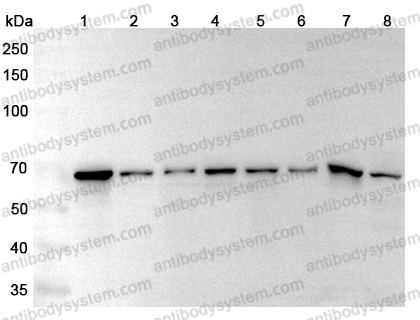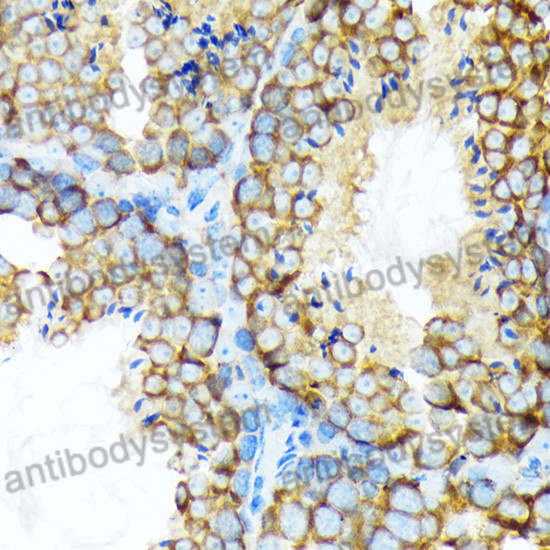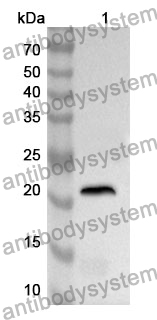Catalog No.
PHD97701
Species reactivity
Human, Mouse, Rat
Host species
Rabbit
Isotype
IgG
Clonality
Polyclonal
Immunogen
E. coli - derived recombinant Human STIP1 (Met1-Lys169).
Tested applications
ELISA: 1:4000-1:8000, IHC: 1:50-1:100, WB: 1:1000-1:4000
Target
Hop,Transformation-sensitive protein IEF SSP 3521,Hsc70/Hsp90-organizing protein,Renal carcinoma antigen NY-REN-11,Stress-induced-phosphoprotein 1,STI1,STIP1
Purification
Purified by antigen affinity column.
Accession
P31948
Applications
ELISA, IHC, WB
Form
Liquid
Storage buffer
0.01M PBS, pH 7.4, 50% Glycerol, 0.05% Proclin 300.
Stability and Storage
Use a manual defrost freezer and avoid repeated freeze thaw cycles. Store at 2 to 8°C for frequent use. Store at -20 to -80°C for twelve months from the date of receipt.
Novel tissue biomarker candidates to predict both deep venous thrombosis and healing outcome after Achilles tendon rupture., PMID:40025102
Parkinson's Disease-Specific Autoantibodies against the Neuroprotective Co-Chaperone STIP1., PMID:35626686
Maternal autoantibody profiles as biomarkers for ASD and ASD with co-occurring intellectual disability., PMID:35618885
Intracellular targeting of STIP1 inhibits human cancer cell line growth., PMID:35116457
Tumor-associated autoantibodies in ESCC screening: Detecting prevalent early-stage malignancy or predicting future cancer risk?, PMID:34753106
Stress-induced phosphoprotein 1 restrains spinal cord ischaemia-reperfusion injury by modulating NF-κB signalling., PMID:34734476
CHIP/STUB1 Ubiquitin Ligase Functions as a Negative Regulator of ErbB2 by Promoting Its Early Post-Biosynthesis Degradation., PMID:34439093
Altered cellular localisation and expression, together with unconventional protein trafficking, of prion protein, PrPC, in type 1 diabetes., PMID:34274990
Risk assessment analysis for maternal autoantibody-related autism (MAR-ASD): a subtype of autism., PMID:33483694
STIP1/HOP Regulates the Actin Cytoskeleton through Interactions with Actin and Changes in Actin-Binding Proteins Cofilin and Profilin., PMID:32365744
Peptides of neuron specific enolase as potential ASD biomarkers: From discovery to epitope mapping., PMID:31812776
Serum Autoantibodies against STIP1 as a Potential Biomarker in the Diagnosis of Esophageal Squamous Cell Carcinoma., PMID:28852266
Maternal autoimmune antibodies alter the dendritic arbor and spine numbers in the infragranular layers of the cortex., PMID:28820892
Autocrine and paracrine STIP1 signaling promote osteolytic bone metastasis in renal cell carcinoma., PMID:28199984
Hyperactivity and attention deficits in mice with decreased levels of stress-inducible phosphoprotein 1 (STIP1)., PMID:26398952
Autism-specific maternal autoantibodies recognize critical proteins in developing brain., PMID:23838888
Tumor stress-induced phosphoprotein1 (STIP1) as a prognostic biomarker in ovarian cancer., PMID:23468915
miR-764-5p promotes osteoblast differentiation through inhibition of CHIP/STUB1 expression., PMID:22407479
IgG from patients with pulmonary arterial hypertension and/or systemic sclerosis binds to vascular smooth muscle cells and induces cell contraction., PMID:22084393
Anti-neuronal and stress-induced-phosphoprotein 1 antibodies in neuro-Behçet's disease., PMID:21875754
Enhanced neural progenitor/stem cells self-renewal via the interaction of stress-inducible protein 1 with the prion protein., PMID:21608082
Discovery and preclinical evaluation of a novel class of cytotoxic propynoic acid carbamoyl methyl amides (PACMAs)., PMID:21443194
Autoantibodies against stress-induced phosphoprotein-1 as a novel biomarker candidate for ovarian cancer., PMID:20461751
C. elegans STI-1, the homolog of Sti1/Hop, is involved in aging and stress response., PMID:19467242
Hop/STI1 modulates retinal proliferation and cell death independent of PrPC., PMID:17651690
Short-term memory formation and long-term memory consolidation are enhanced by cellular prion association to stress-inducible protein 1., PMID:17329112
Interaction of cellular prion and stress-inducible protein 1 promotes neuritogenesis and neuroprotection by distinct signaling pathways., PMID:16339028
Immunization with a polyprotein vaccine consisting of the T-Cell antigens thiol-specific antioxidant, Leishmania major stress-inducible protein 1, and Leishmania elongation initiation factor protects against leishmaniasis., PMID:12117930
Stress-inducible protein 1 is a cell surface ligand for cellular prion that triggers neuroprotection., PMID:12093732
The involvement of p23, hsp90, and immunophilins in the assembly of progesterone receptor complexes., PMID:8603045
Identification of a 60-kilodalton stress-related protein, p60, which interacts with hsp90 and hsp70., PMID:8423808
Molecular cloning and expression of a transformation-sensitive human protein containing the TPR motif and sharing identity to the stress-inducible yeast protein STI1., PMID:1569099



